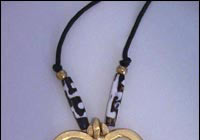|
|
I hope you enjoyed the last column, in which I dealt with changing negative self-talk into positive, encouraging self-talk for better riding. I can’t stress enough how important that is to success. You can train all you want, get your technique down perfectly, and none of it will matter if you still put yourself down when it comes time to compete.
One of you sent me an e-mail recently asking if I am a trainer. The short answer is no.
A longer and more accurate answer is that what I hope to accomplish for riders is to help them improve their riding from the inside out, while your coaches and trainers focus on riding skills and techniques. Your trainer guides you through physical rehearsal, while I guide you through mental rehearsal.
What I do is not a replacement for training by any means, but rather a complement to it and a way to make sure you retain the information you get from your trainer, and have the confidence to succeed as your skill level increases. The mental side of competitive riding is something I feel is far too often ignored, and that keeps a lot of good riders out there from being great.
At any rate, this time I’d like to write a little about dealing with issues from our past, and how it can affect our riding.
Do you condemn yourself for things that you did in the past? Everyone does this at some point. Perhaps there are choices that you made at crucial turning points in your life that you’d like to take back. Maybe you treated someone you cared for poorly and wish you had another chance. In your riding, perhaps you made a mistake that cost you a competition and you are still angry and frustrated at yourself about it.
If you want to be successful in life, and to a lesser degree in your riding, it’s crucial that you release the past and not blame yourself for events that have already transpired and that you cannot change.
Ask yourself this question: has "beating yourself up" about the past ever helped you or made you feel better? In the ring, has it ever made you ride better? If your answer is "no," I urge you to make a commitment to stop this self-defeating behavior.
Let me add this: I tell people over and over again that changing your behavior is more than just making the decision to do it. A perfect example is what most people do with “New Year’s Resolutions.” People always say things like, “I’m going to be a more positive person,” or, “I’m going to treat my body better.”
What keeps many people from accomplishing these types of goals is simple. What do you do if your trainer teaches you how to make better transitions? You practice it until you get it right, of course. What eludes most people is that changing the way we approach things mentally is the same way. So, if you feel like you beat yourself up over past mistakes and want to change your behavior, you’ll be able much more successful if you practice, practice, practice.
The successful person takes this approach: If you have done something in the past that you feel you can and should change, then by all means take action. If you have been unkind to someone, apologize to them. If you failed to fulfill a promise you made, take steps to fulfill that promise. If you made a mistake in competition, devote more of your practice time to whatever it was you had difficulty with.
The opposite approach is to wallow in regret and self-pity over these things. This does nothing to help you move forward. In fact, just about the only thing it does is waste your mental energy.
“If you have made mistakes – even serious ones – there is always another chance for you. What we call failure is not the falling down, but the staying down.” -- Mary Pickford
So, the bottom line is that we ought to learn from past mistakes and make adjustments in future behavior. The strategy of berating yourself for past conduct solves nothing and only serves to lower your self-esteem. You create a vicious cycle where negative experiences and negative feelings are reinforced, which leads to more negative outcomes and more negative feelings.
You are not going to change one bit of your past. What’s done is done. Learn from your past experiences and move on. You did the best you could, given your awareness and understanding of your options at the time. You are human and it is in our nature to make mistakes. It is your right and your privilege as a human being. You have nothing to gain from self-condemnation, except feelings of misery and inadequacy.
If you have a hard time stopping yourself from dwelling in the past, I suggest that you try to focus on your past successes rather than mistakes. Visualizing and thinking about past successes is an excellent way to build confidence and self-esteem. What you think about is what you become (as you read in my self-talk column). Therefore, when you concentrate on your successes, you help to create future successes. It really works!
When you find yourself starting to dwell on past negative experiences, work on stopping and reminding yourself: "There is nothing I can do now to change what happened. I learned a valuable lesson and will take steps moving forward so that I will be successful from now on."
Here’s a passage from my “Fearless Showing and Jumping” CD. I haven’t included anything from my CD's in past columns and have heard from some of you that you’d like a sample. This one relates directly to what I’ve said about forgiving yourself for mistakes and focusing on the present.
In the CD, this is one of many suggestions that are made to you after you have become completely relaxed and are in a highly receptive state of mind:
“You are grateful and thankful for every experience of the past, and for everything connected with those experiences. You find it easy to let go of your fears. You forgive yourself for every mistake you have ever made. You are a part of life, as we all are, and we all move, live, and think as we have a right to. Life goes on, and so do you: Growing rich in experience and in the capacity to achieve. You are stronger than anything life can offer.”
As always, I hope this has been helpful to you. Feel free to send me an email should you have any questions or should you like some individual help with your mental approach to riding.
|



